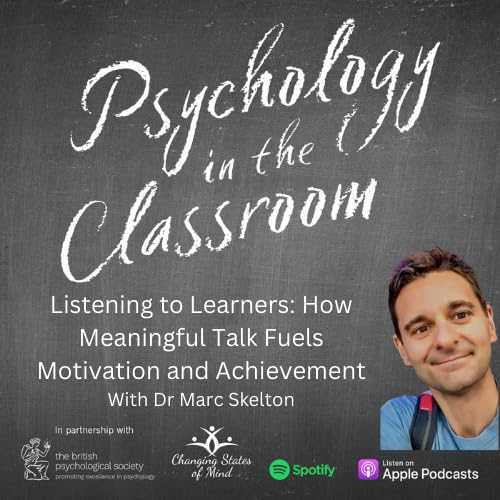…with Dr. Marc Skelton.
In this episode we bridge the gap between classroom practice and psychological theory to share actionable strategies for fostering student success. Drawing on years of teaching experience to research at the University of Warwick, Marc breaks down what truly drives student engagement.
Marc introduces us to Paulo Freire's "banking model" of education, and advocates for a shift to active, meaningful learning where students are co-creators of knowledge. The core of the conversation centres on Self-Regulated Learning (SRL), exploring Barry Zimmerman's three phases: Forethought (planning), Performance (the "missing middle" of self-monitoring), and Self-Reflection (learning from experience).
We then dive into the Transformative Power of Goal Setting, emphasizing that success requires both Agency ("I can do this") and Pathways (concrete plans). Learn about the impact of Goal Diaries and the critical role of Meaningful Talk and Social Support in sustaining motivation. Finally, we discuss how educators can redefine success by celebrating Achievement (personal growth) over mere Attainment (grades), creating classrooms where every student thrives.
Bullet points:
-
Dual role of the speaker as a teacher and researcher in educational psychology.
-
Journey into teaching mathematics and interest in educational psychology.
-
Exploration of student motivation and engagement in learning.
-
Influence of Paulo Freire's pedagogy and Albert Bandura's agency theory on educational practices.
-
Development of a tutor time program focused on metacognition and self-regulated learning.
-
Insights from research on definitions and perceptions of learning among students and teachers.
-
Distinction between attainment (external measures) and achievement (personal significance) in education.
-
Importance of self-regulated learning, goal setting, and meaningful communication in enhancing student motivation.
-
Findings on the impact of social interaction and support on students' goal achievement and well-being.
-
Advocacy for integrating psychological principles into educational practices to foster meaningful learning experiences.
Marc's Website visit www.positivelearningpsychology.com
Theories, Books and Researchers "Pedagogy of the Oppressed" and "Pedagogy of Hope" by Paulo Freire
Albert Bandura - agency theory
Martin Seligman - Positive Psychology
George Kelly - Personal Construct Psychology
Carl Rogers - Person-Centered Approach
Carol Dweck - growth mindset
Zimmerman & Schunk (1989) Self-regulated learning and academic achievement: Theory, research, and practice
Ryan and Deci (2000) - Self determination theory
Paul A. Kirschner, John Sweller & Richard E. Clark - Why Minimal Guidance During Instruction Does Not Work: An Analysis of the Failure of Constructivist, Discovery, Problem-Based, Experiential, and Inquiry-Based Teaching
Snyder (2000) Hope Theory
Barbara Fredrickson - Broaden and Build Theory
Rosenshine's principles of instruction
Key Stage Three: The Wasted Years? Department for education
 Feb 11 202639 mins
Feb 11 202639 mins Jan 28 202631 mins
Jan 28 202631 mins 41 mins
41 mins 29 mins
29 mins 38 mins
38 mins 49 mins
49 mins 42 mins
42 mins 32 mins
32 mins
